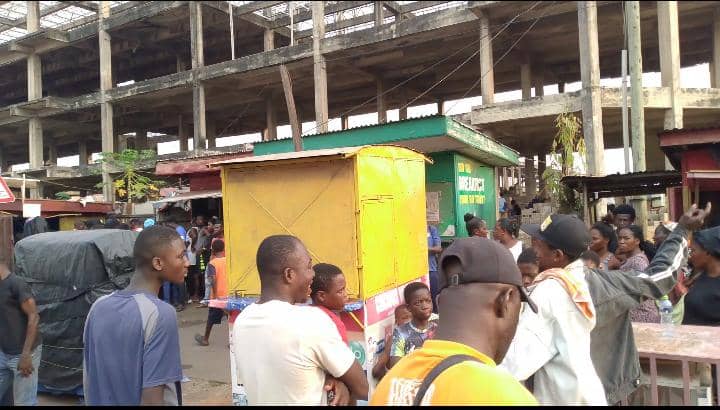ARTICLE AD
Attorney-General and Minister of Justice, Dr. Dominic Akuritinga Ayine has provided a detailed explanation for his decision to withdraw the charges against former COCOBOD Chief Executive, Dr. Stephen Opuni and businessman Seidu Agongo.
He maintained that the grounds for their prosecution were untenable, citing significant evidence proving the efficacy of Lithovit liquid fertilizer which was at the centre of the prosecution based on which they were charged for allegedly causing financial loss to state.
Upon assuming office, Dr. Ayine reviewed prosecutions initiated by his predecessors, Gloria Akuffo and Godfred Yeboah Dame, and made decisions regarding their continuation.
He emphasised his commitment to upholding accountability while ensuring fairness in prosecutorial decisions.
Justifications for withdrawal
The Attorney General also gave three key reasons for dropping the charges: on ethical and professional considerations, he said he could not, in good conscience, continue certain prosecutions given the weight of evidence contradicting the charges.
He also mentioned defective charges where he said thorough review revealed that some charges were not supported by facts or common sense.
There was also overwhelming doubt regarding guilt, which he said the prosecution failed to prove that Lithovit fertilizer was ineffective, contrary to the claims of the State.
Dr. Dominic Ayine, at a press conference on Wednesday, February 12, 2025, stressed that his decision aligns with constitutional requirements, particularly Article 296, which mandates fairness, reasonableness, and transparency in the exercise of discretionary power.
According to him, he consulted widely with the Director of Public Prosecutions, defence lawyers, investigators, and stakeholders before making his determinations.
Traditionally, the Attorney General is not required to explain the entry of a nolle prosequi, but Ayine insisted on transparency and outlined the distinction between entering a nolle prosequi, which allows for future re-prosecution, and withdrawing charges, which leads to acquittal if done after the prosecution closes its case.
Evidentiary support for Lithovit’s efficacy
The case against Dr. Opuni and Seidu Agongo hinged on the assertion that Lithovit fertilizer was substandard, causing financial loss to the state.
He however, confirmed that no farmer was called by the prosecution as a witness to substantiate this claim. Instead, statements from COCOBOD officials and field reports indicated that Lithovit was highly effective and preferred over other fertilizers.
“More importantly, in the course of the investigation, [EOCO] took statements from two farmers. While 1 (one) stated that he did not see any significant change on his farm, the second farmer stated that after using Lithovit fertilizer, he saw a significant increase in yield, and that Lithovit fertilizer is a very good fertilizer.
“Again, in the course of the trial, the defence tended an official report from COCOBOD which covered field visits by COCOBOD officials. The report, which was tendered, is to the effect that Lithovit fertilizer is a very good fertilizer and that farmers actually preferred Lithovit fertilizer to other fertilizers and was the fertilizer of choice in areas in which Lithovit fertilizer was supplied.
“This is clear evidence that contrary to the case of the Prosecution, the use of Lithovit fertilizer rather increased yield. The farmers who used Lithovit fertilizer, including the then national best farmer, in their evidence testified that Lithovit fertilizer use increased their yield and that Lithovit fertilizer is a good fertilizer.”
He also stated the fact that investigators received conflicting reports from the Ghana Standards Authority (GSA). The first, conducted by the cosmetics department, according to GSA officials to the court, lacked the mandate to test fertilizers but stated that Lithovit was devoid of fertilizer components.
However, he noted, a second test, conducted by the material science department, which is the appropriate department, confirmed that Lithovit was indeed a fertilizer and efficacious.
Additionally, the prosecution’s key witness, Dr. Yaw Adu Ampomah, was accused of perjury for allegedly providing false testimony against the accused.
Dr. Ayine expressed concern about judicial impartiality in the case and criticised former trial judge Justice Clemence Jackson Honyenuga for expunging crucial exculpatory evidence in his chambers whilst ruling on the submission of no case, and also failing to hear the perjury application against Dr. Adu Ampomah.
“This is most unacceptable because in a criminal trial it is important to hold the scale of justice evenly and any doubt raised must inure to the benefit of the accused,” he asserted.
Furthermore, Justice Anokye Gyimah’s decision to conduct a de novo trial was swiftly overturned, and the judge transferred from Accra to Kumasi, raising concerns about fairness.
He also highlighted instances where judges handling politically sensitive cases were promoted, creating perceptions of inducement.
“The decisions by the executive branch of government to promote some judges who were sitting on some of the cases is very concerning. The perception whether true or not, is that the promotion may be an inducement to convict the accused persons.”
The Attorney-General also explained the reasons behind cases involving Finance Minister Dr. Cassiel Ato Forson, Governor of Bank of Ghana Dr. Johnson Asiama, and Member of Parliament for Asutifi South, Collins Dauda.
He assured the public that his decisions were made independently and in the best interest of justice, rejecting suggestions of external influence, and affirming that President John Mahama had not directed him to drop any case.
While emphasising the distinction between causing financial loss and outright corruption, he noted that none of the accused had looted state resources.
Dr. Ayine therefore reiterated his commitment to balancing public interest with the rights of accused persons and ensuring that the judicial process remains fair and credible.

DISCLAIMER: The Views, Comments, Opinions, Contributions and Statements made by Readers and Contributors on this platform do not necessarily represent the views or policy of Multimedia Group Limited.

 
 
 
 
 
 
 
 
 

 3 hours ago
2
3 hours ago
2 

